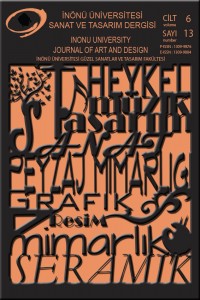Öz
This study aims to examine Samuel Beckett’s Endgame as an absurdist play considering certain aspects and characteristics of this kind of drama such as silence, pause, repetitions, no story or plot, no recognizable or definable decor, unconventional dialogue and interest in global and universal problems rather than contemporary issues. With the changing state of the world and especially due to the destructive effects of the Second World War, feelings of meaninglessness and nothingness spread over the world sending forth despair and disenchantment with the accepted values. Beckett, reflecting these issues in his plays, can be considered to be a prominent absurdist playwright and his play Endgame is a typical absurdist play which depicts the characteristics of this kind of drama and shows the emptiness and alienation in the modern world. In this study, by examining this play, it is depicted that with the absurdist drama the alienated modern world is successfully put on the stage and the familiar well-made plays have begun to be replaced by these typical examples of absurdist drama.
Anahtar Kelimeler
Kaynakça
- Astro, A. 1990. Understanding Samuel Beckett. Columbia: University of South Caroline Press.
- Beckett, S. 1986. The Complete Dramatic Works. London: Faber and Faber.
- Beckett, S. Samuel Beckett > Quotes > Quotable Quote. 29 March. 2011. <http:// http://www.goodreads.com/quotes/show/30560>
- Camus, A. 1942. Le Mythe de Sisyphe. (Seizieme ed.) Paris: Gallimard.
- Cooke, V. 1985. Beckett on File. London: Methuen.
- Esslin, M. 1980. The Theatre of the Absurd. London: Penguin Books.
- Greenblatt, S. et al. (ed.) 2006. The Norton Anthology of English Literature. (8th ed, Volume II.) London, New York: W.W. Norton & Company.
- Hale, J. A. 1992. “Endgame: How Are Your Eyes?”. Waiting for Godot and Endgame. Ed. Steven Connor. London: Macmillan. 71-86.
- Harmon, W. and Holman, C. H. 1995. A Handbook to Literature. New Jersey: Prentice Hall.
- Lawley, P. 1992. “Adoption in Endgame”. Waiting for Godot and Endgame. Ed. Steven Connor. London: Macmillan. 119-127.
- Schwab, G. 1992. “On the Dialectic of Closing and Opening in Endgame”. Waiting for Godot and Endgame. Ed. Steven Connor. London: Macmillan. 87-99.
- Weales, G. 1962. The Language of Endgame. The Tulane Drama Review. 6 (4): 107-117.
- Worton, M. 1994. “Waiting for Godot and Endgame: theatre as text”. The Cambridge Compainion to Beckett. Ed. John Pilling. Cambridge: Cambridge University Press. 67-85.
- Yüksel, A. 1992. Samuel Beckett Tiyatrosu. İstanbul: Yapı Kredi Yayınları.
Öz
Kaynakça
- Astro, A. 1990. Understanding Samuel Beckett. Columbia: University of South Caroline Press.
- Beckett, S. 1986. The Complete Dramatic Works. London: Faber and Faber.
- Beckett, S. Samuel Beckett > Quotes > Quotable Quote. 29 March. 2011. <http:// http://www.goodreads.com/quotes/show/30560>
- Camus, A. 1942. Le Mythe de Sisyphe. (Seizieme ed.) Paris: Gallimard.
- Cooke, V. 1985. Beckett on File. London: Methuen.
- Esslin, M. 1980. The Theatre of the Absurd. London: Penguin Books.
- Greenblatt, S. et al. (ed.) 2006. The Norton Anthology of English Literature. (8th ed, Volume II.) London, New York: W.W. Norton & Company.
- Hale, J. A. 1992. “Endgame: How Are Your Eyes?”. Waiting for Godot and Endgame. Ed. Steven Connor. London: Macmillan. 71-86.
- Harmon, W. and Holman, C. H. 1995. A Handbook to Literature. New Jersey: Prentice Hall.
- Lawley, P. 1992. “Adoption in Endgame”. Waiting for Godot and Endgame. Ed. Steven Connor. London: Macmillan. 119-127.
- Schwab, G. 1992. “On the Dialectic of Closing and Opening in Endgame”. Waiting for Godot and Endgame. Ed. Steven Connor. London: Macmillan. 87-99.
- Weales, G. 1962. The Language of Endgame. The Tulane Drama Review. 6 (4): 107-117.
- Worton, M. 1994. “Waiting for Godot and Endgame: theatre as text”. The Cambridge Compainion to Beckett. Ed. John Pilling. Cambridge: Cambridge University Press. 67-85.
- Yüksel, A. 1992. Samuel Beckett Tiyatrosu. İstanbul: Yapı Kredi Yayınları.
Ayrıntılar
| Bölüm | Görsel ve Plastik Sanatlar / Visual and Plastic Arts |
|---|---|
| Yazarlar | |
| Yayımlanma Tarihi | 31 Ocak 2016 |
| Gönderilme Tarihi | 19 Nisan 2016 |
| Yayımlandığı Sayı | Yıl 2016 Cilt: 6 Sayı: 13 |


